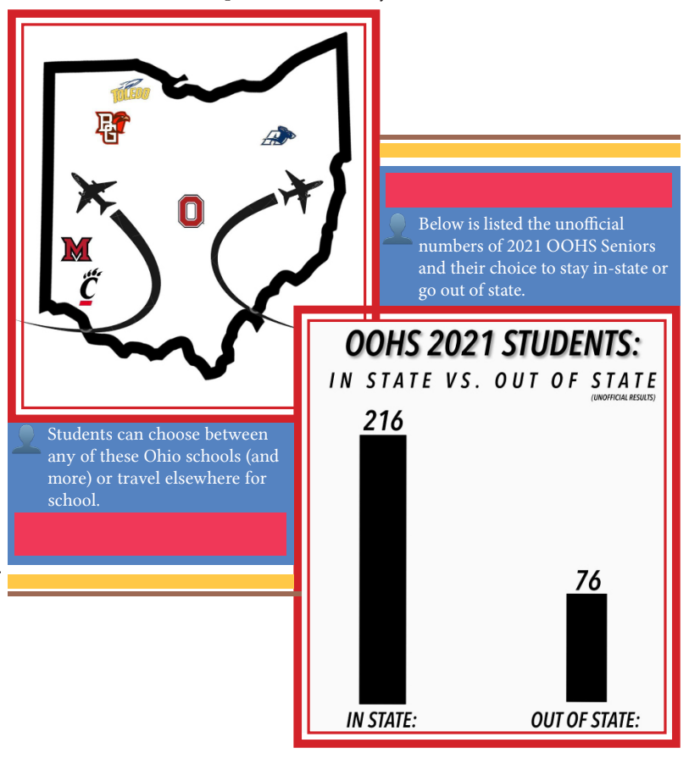
design: DJ Pelles
A college education is a path that many students take following high school. Not only is college a place for students to go in order to receive higher education and pursue certain careers, but it is also a major change in their way of life.
For the past 13 years of students’ lives, they have followed a similar routine from kindergarten all the way up until 12th grade. Then suddenly, students who are still only about 18 years old usually move out of their childhood homes and live in a new area on their own in order to attend college. This can be an exciting step in life, but it can also bring its challenges.
A major determinant of the different lifestyles new college students face is whether they are attending college in their home state or out of state. The majority of seniors at the high school this year are going to college in-state, but both types of college students have things they like as well as challenges based on their college location.
There are already more than 100 students committed to colleges in the state, including more than 40 going to the Ohio State University alone. The number committed to out-of-state colleges is much fewer, but these students have their voice as well.
“I wanted to go out of state to have a new experience,” senior Jack Helmer said. Helmer is attending Brigham Young University in Provo, UT this fall. “I wanted to live somewhere new and feel like I’m doing my own thing and living on my own.”
This can come with issues though; for example, the situation with cars for freshmen is often difficult for out-of-state students to deal with. Many schools around the country have a policy about freshmen not being allowed to have cars on campus, but this can make it harder for out-of-state students to come home. Helmer, for example, will have to fly home from BYU on all his breaks, which is one of many extra prices to pay on leaving the state for college.
Regardless of these costs, leaving the state can definitely still bring excitement. However, others also appreciate the convenience of staying in state.
“The ability to come home easily over break” is something that senior Blaine Simonds looks forward to about staying in state to attend Miami University. “The price will be much cheaper, and if you want to stay close to home, you also get that ability,” Simonds said.
Despite convenience and good prices, there are also reasons to regret staying in state for college. For Simonds, “the Midwest weather” is one factor that made him second guess staying in state for the next four years of his life.
As mentioned though, both types of college students have their own likes and dislikes, and as Helmer goes out of state for college, there are elements that he knows he will miss out on by leaving Ohio.
“I’m going to miss my friends and family and the familiarity of Ohio,” Helmer said. “I’ve lived here my whole life, so it will definitely be a change going out of state that I will have to adjust to.”
So, with these different styles of college living, many students often wonder what is more worth prioritizing: creating a new life and gaining new experiences or having accessibility to home and often cheaper prices.
“In my opinion, a pro of going out of state is getting that new experience living somewhere new,” Helmer said. “A con is leaving family and friends, while also having to adjust to a new area.”
As students are moving out for college, it’s important to remember that college will be college no matter what. Whether 15 minutes or 15 hours away, the education will always be there. And while education is of course a priority, college also serves as a rite of passage to adulthood for students. Their life experiences may differ based on location, and whether it’s for the better or worse is up to each individual.


